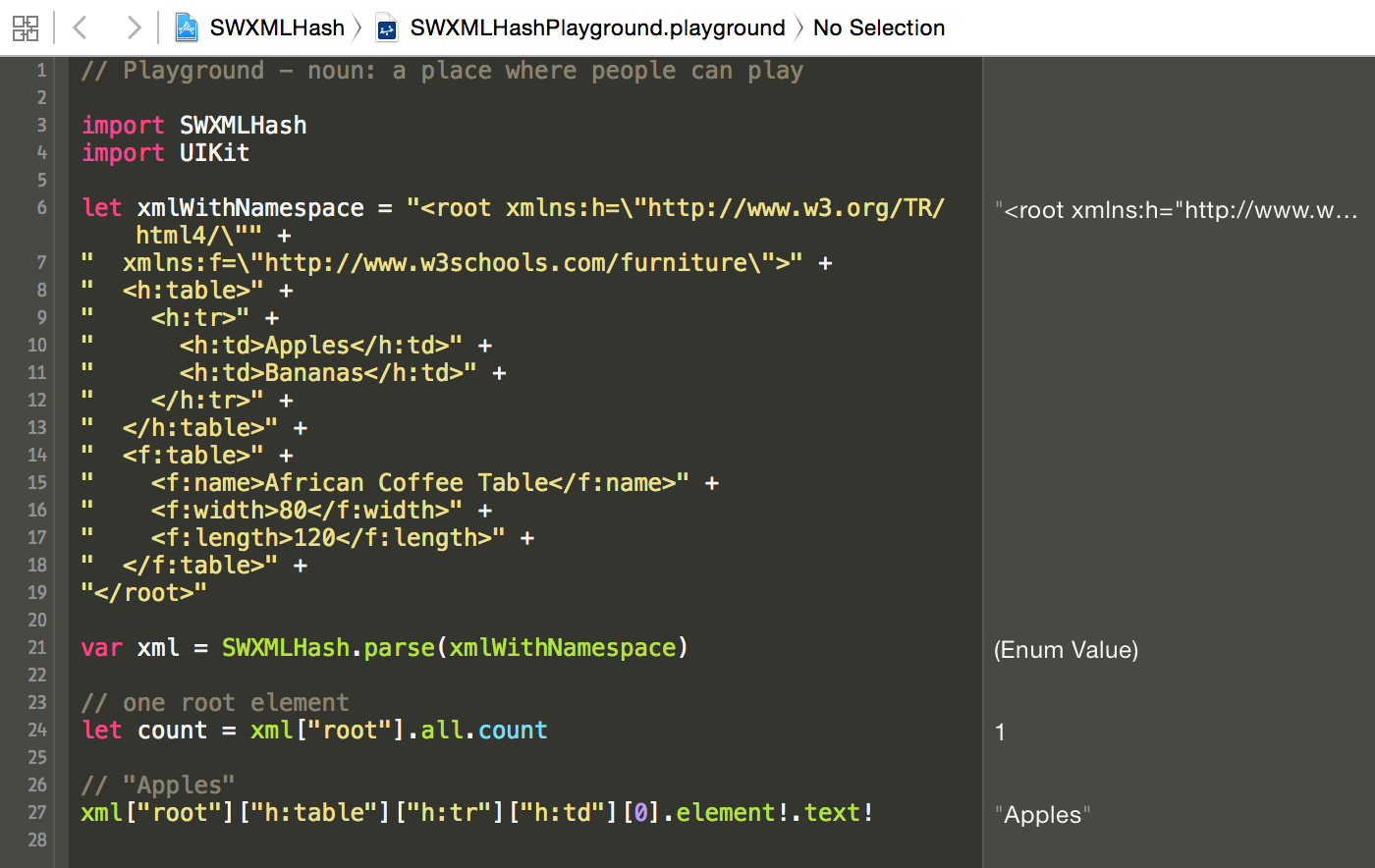SWXMLHash is a relatively simple way to parse XML in Swift. If you're familiar with NSXMLParser, this library is a simple wrapper around it. Conceptually, it provides a translation from XML to a dictionary of arrays (aka hash).
The API takes a lot of inspiration from SwiftyJSON.
- iOS 8.0+ / Mac OS X 10.9+ / tvOS 9.0+ / watchOS 2.0+
- Xcode 7.1+
SWXMLHash can be installed using CocoaPods, Carthage, or manually.
To install CocoaPods, run:
$ gem install cocoapodsThen create a Podfile with the following contents:
source 'https://github.com/CocoaPods/Specs.git'
platform :ios, '8.0'
pod 'SWXMLHash', '~> 2.0.0'Finally, run the following command to install it:
$ pod installTo install Carthage, run (using Homebrew):
$ brew update
$ brew install carthageThen add the following line to your Cartfile:
github "drmohundro/SWXMLHash" ~> 2.0
To install manually, you'll need to clone the SWXMLHash repository. You can do this in a separate directory or you can make use of git submodules - in this case, git submodules are recommended so that your repository has details about which commit of SWXMLHash you're using. Once this is done, you can just drop the SWXMLHash.swift file into your project.
NOTE: if you're targeting iOS 7, you'll have to install manually because embedded frameworks require a minimum deployment target of iOS 8 or OSX Mavericks.
If you're just getting started with SWXMLHash, I'd recommend cloning the repository down and opening the workspace. I've included a Swift playground in the workspace which makes it very easy to experiment with the API and the calls.
SWXMLHash allows for limited configuration in terms of its approach to parsing. To set any of the configuration options, you use the configure method, like so:
let xml = SWXMLHash.config {
config in
// set any config options here
}.parse(xmlToParse)The available options at this time are:
shouldProcessLazily- This determines whether not to use lazy loading of the XML. It can significantly increase the performance of parsing if your XML is very large.
- Defaults to
false
shouldProcessNamespaces- This setting is forwarded on to the internal
NSXMLParserinstance. It will return any XML elements without their namespace parts (i.e. "<h:table>" will be returned as "<table>") - Defaults to
false
- This setting is forwarded on to the internal
All examples below can be found in the included specs.
let xml = SWXMLHash.parse(xmlToParse)Alternatively, if you're parsing a large XML file and need the best performance, you may wish to configure the parsing to be processed lazily. Lazy processing avoids loading the entire XML document into memory, so it could be preferable for performance reasons. See the error handling for one caveat regarding lazy loading.
let xml = SWXMLHash.config {
config in
config.shouldProcessLazily = true
}.parse(xmlToParse)The above approach uses the new config method, but there is also a lazy method directly off of SWXMLHash.
let xml = SWXMLHash.lazy(xmlToParse)Given:
<root>
<header>
<title>Foo</title>
</header>
...
</root>Will return "Foo".
xml["root"]["header"]["title"].element?.textGiven:
<root>
...
<catalog>
<book><author>Bob</author></book>
<book><author>John</author></book>
<book><author>Mark</author></book>
</catalog>
...
</root>The below will return "John".
xml["root"]["catalog"]["book"][1]["author"].element?.textGiven:
<root>
...
<catalog>
<book id="1"><author>Bob</author></book>
<book id="123"><author>John</author></book>
<book id="456"><author>Mark</author></book>
</catalog>
...
</root>The below will return "123".
xml["root"]["catalog"]["book"][1].element?.attributes["id"]Alternatively, you can look up an element with specific attributes. The below will return "John".
xml["root"]["catalog"]["book"].withAttr("id", "123")["author"].element?.textGiven:
<root>
...
<catalog>
<book><genre>Fiction</genre></book>
<book><genre>Non-fiction</genre></book>
<book><genre>Technical</genre></book>
</catalog>
...
</root>The below will return "Fiction, Non-fiction, Technical" (note the all method).
", ".join(xml["root"]["catalog"]["book"].all.map { elem in
elem["genre"].element!.text!
})Alternatively, you can just iterate over the elements using for-in directly against an element.
for elem in xml["root"]["catalog"]["book"] {
NSLog(elem["genre"].element!.text!)
}Given:
<root>
<catalog>
<book>
<genre>Fiction</genre>
<title>Book</title>
<date>1/1/2015</date>
</book>
</catalog>
</root>The below will NSLog "root", "catalog", "book", "genre", "title", and "date" (note the children method).
func enumerate(indexer: XMLIndexer) {
for child in indexer.children {
NSLog(child.element!.name)
enumerate(child)
}
}
enumerate(xml)Using Swift 2.0's new error handling feature:
do {
try xml!.byKey("root").byKey("what").byKey("header").byKey("foo")
} catch let error as XMLIndexer.Error {
// error is an XMLIndexer.Error instance that you can deal with
}Or using the existing indexing functionality (NOTE that the .Error case has been renamed to .XMLError so as to not conflict with the XMLIndexer.Error error type):
switch xml["root"]["what"]["header"]["foo"] {
case .Element(let elem):
// everything is good, code away!
case .XMLError(let error):
// error is an XMLIndexer.Error instance that you can deal with
}Note that error handling as shown above will not work with lazy loaded XML. The lazy parsing doesn't actually occur until the element or all method are called - as a result, there isn't any way to know prior to asking for an element if it exists or not.
See CHANGELOG for a list of all changes and their corresponding versions.
This framework uses Quick and Nimble for its tests. To get these dependencies, you'll need to have Carthage installed. Once it is installed, you should be able to just run carthage update.
To run the tests, you can either run them from within Xcode or you can run rake test.
The code loosely follows GitHub's Swift Styleguide. The line length recommendations aren't strictly followed and the codebase is currently using spaces over tabs. I'm using SwiftLint to catch issues with style.
SWXMLHash is released under the MIT license. See LICENSE for details.




